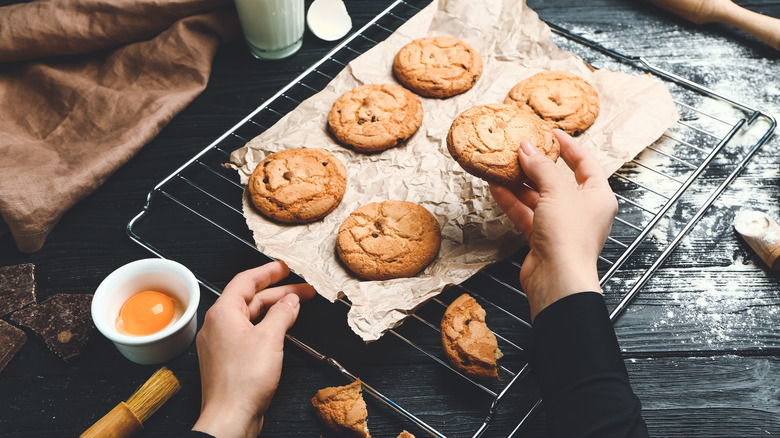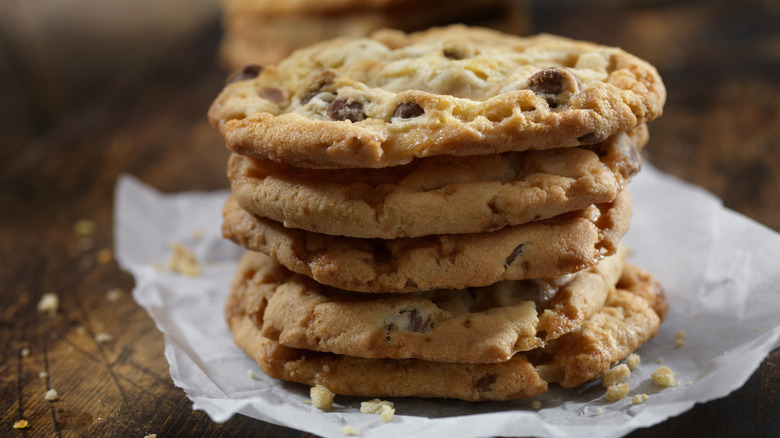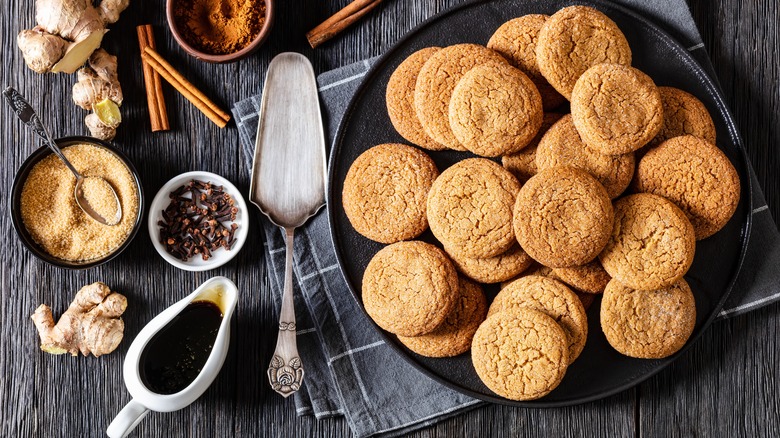For The Crinkliest Cookies, You Need This Sheet Pan Hack
Cookies are almost always good. Crunchy or chewy, overcooked or undercooked, there is usually something to salvage from the quintessential baked treat. However, a truly perfect cookie is simply on another level. Crispy on the edges and chewy at the center, biting into a perfect and freshly baked cookie can save an otherwise dull day. And there is one trick that can help you to take your cookies to that crinkly, crispy, and chewy-centered level: banging your cookie pan on the counter.
No, we're not talking about taking your anger out on your cooking equipment. But banging out your cookies can make the most of your batch of cookie dough. Now, banging your cookie dough once placed on your sheet pan is not exactly a new idea. However, baking blogger Sarah Kieffer of The Vanilla Bean Blog took this hack to another level in her viral Pan-Banging Chocolate Chip Cookie recipe. The recipe calls for home cooks to bang their cookies throughout the baking process, and again once removed from the oven. Doing so causes your cookies to deflate, giving them distinctive crinkly, rippling edges and a chewy, delicious center. This sheet pan hack can take your cookie recipe from good to fantastic, highlighting the crispy texture that so many home bakers hope to replicate in their cookies. The process is simple enough, and if used in conjunction with a few other baking hacks, can yield supremely delicious cookies.
No more chewy edges
Banging your sheet pans on the counter isn't the only way to make your cookies crispy and delicious. There are, in fact, less violent ways of crisping your cookies. Adding some swap-outs in your stand-by cookie recipe can enhance the effects of the pan-banging method. One method of making cookies crispy is to swap out brown sugar for white sugar in your recipe. White sugar contains less moisture than brown sugar and will yield a crispier cookie.
Now, most cookie recipes already call for butter, and there are some tasty reasons behind that. Thanks to its low melting temperature, using butter in your recipe rather than oil will yield a crispier cookie. Additionally, butter contains proteins that help in the browning process. The ultimate goal for crispy cookies is to lower moisture content and increase browning. Melting your butter yields flatter, denser cookies, which also makes getting that crinkly effect even easier.
Cooking your cookies on aluminum foil can also help with the browning process, especially with browning the bottom of your cookies. However, aluminum foil can cause uneven baking, so be watchful if you use it. These methods can all be used together to create the crispiest possible cookie. However, crispy cookies aren't everyone's forte — some people prefer a softer, chewier cookie. There are other tricks you can implement to yield your preferred results and give your cookies a richer taste. After all, when it comes to cookies, you can choose your own experience.
The chewier the better?
Crispy cookies seem to be the most popular variation of cookies. Tate's Cookies is a brand that has made its name off of making crispy thin cookies, after all. However, for some selective baked goods enthusiasts, nothing beats a soft, chewy, and delicious batch of cookies. And for them, making a crispier batch of cookies isn't necessarily the end goal. So how then do you go about making a softer cookie? For one, you will want to increase the moisture content of your cookie dough.
You can do so by using brown sugar either in combination with, or in place of, white sugar. Because it contains molasses, brown sugar has a higher moisture content and will therefore yield a softer cookie. Additionally, brown sugar will give your cookie a warmer flavor. Replacing your white sugar with brown sugar can be an excellent add-in to chocolate chip cookies, helping to mellow the sharp taste of the semi-sweet chocolate chips. And if you're looking to make your cookies more rich in flavor, adding additional egg yolks can help make your cookies extra chewy and delicious. Of course, there are many ways to customize your cookie experience. Sometimes it's best to just bang a few methods out on your own and see what works best for you.


